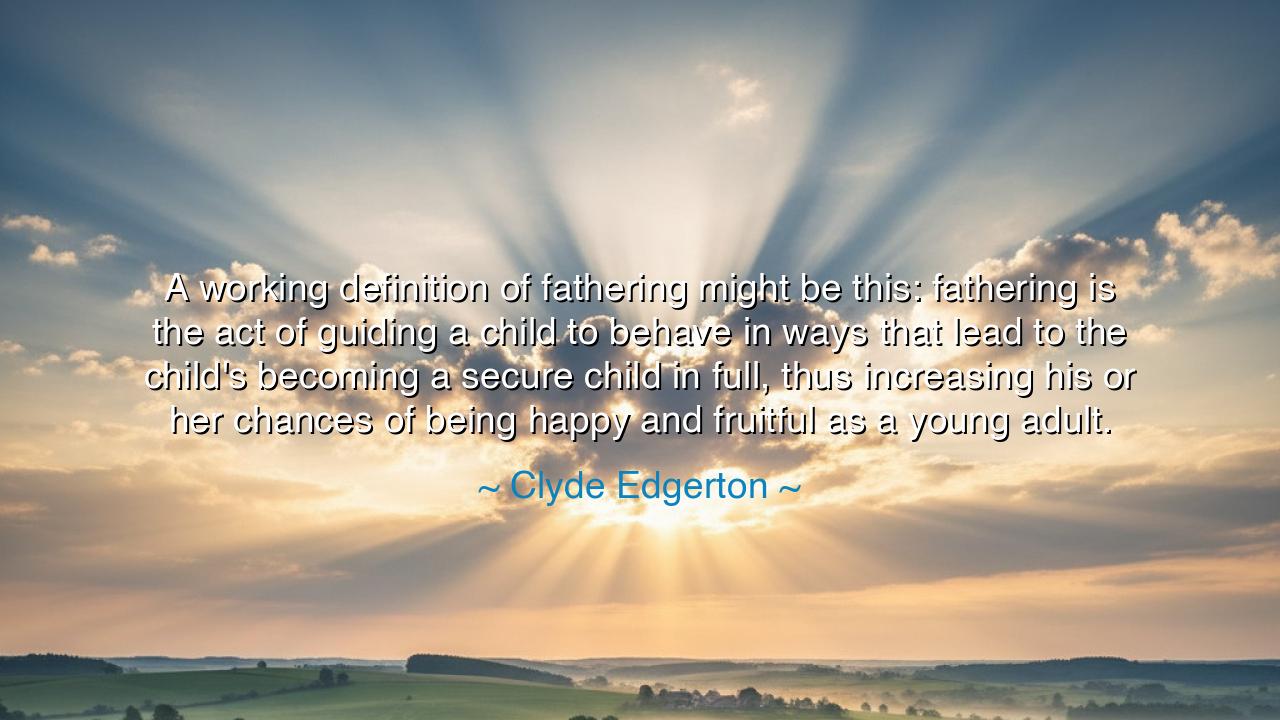
A working definition of fathering might be this: fathering is the
A working definition of fathering might be this: fathering is the act of guiding a child to behave in ways that lead to the child's becoming a secure child in full, thus increasing his or her chances of being happy and fruitful as a young adult.






In the sacred bond between parent and child, Clyde Edgerton offers a definition that echoes through the halls of time: “A working definition of fathering might be this: fathering is the act of guiding a child to behave in ways that lead to the child’s becoming a secure child in full, thus increasing his or her chances of being happy and fruitful as a young adult.” These words are not the cold lines of theory—they are the warm breath of life itself. They remind us that fathering is not merely about protection or authority, but about guidance, nurture, and the shaping of a soul toward confidence and joy. For in the quiet heart of every child lies a seed, and it is the father’s hand that turns the soil and gives it sun.
The ancients spoke often of the sacred duty of fathers. In their wisdom, they saw that to father was to be more than a provider of bread—it was to be a builder of character, a guardian of spirit, and a mirror of strength. The father’s presence, firm yet tender, teaches the child how to walk through the world without fear. His guidance, given not through tyranny but through love, becomes the invisible compass by which the young one finds his or her way long after the father is gone. A true father gives not only life but direction, not only rules but roots.
We see this ancient truth embodied in the story of Odysseus and Telemachus, from the old Greek tales. While Odysseus wandered far from home, his son grew in uncertainty, lost among suitors and temptations. Yet when the father at last returned, disguised and weary, he did not offer his son gold or crowns—he offered wisdom, courage, and the calm strength of example. Telemachus, through his father’s guidance, became a man of resolve, no longer a boy adrift. Thus, even in myth, the meaning of fathering shines clear: to guide the young toward security, to prepare them for the trials of the world with faith in themselves.
To raise a secure child, as Edgerton says, is not to shield them from pain, but to teach them how to endure it. The father’s love is not a cage—it is a forge. Through discipline tempered by compassion, the child learns self-control. Through encouragement, they learn courage. Through the father’s belief, they learn to believe in themselves. Such a child does not stumble blindly into adulthood but walks upright, able to face storms without losing peace. The fruit of such fathering is not obedience alone, but happiness, fruitfulness, and freedom.
Yet, in our modern age, this art of fatherhood is too often forgotten. Some fathers, lost in the noise of ambition, mistake their duty for mere provision—food, shelter, and schooling. But a child does not grow secure on bread alone. He hungers for presence, for guidance in the unseen things: how to speak truth, how to love with honor, how to rise after failure. A father who offers these is not merely raising a child—he is shaping the future of humanity itself. For every generation is built upon the foundation laid by the one before.
The wise father knows that his influence stretches far beyond his years. The lessons whispered beside the bed, the example shown in moments of hardship, the quiet strength offered in times of fear—all these become the eternal inheritance of the child. Long after the father’s voice is gone, his teachings echo in the choices his child makes, in the kindnesses shown, in the strength displayed when life grows hard. This is the immortality of fatherhood—to live on not through monuments, but through the character of one’s children.
Let us take, then, this teaching to heart: to be a father—or to honor one—is to understand the sacred power of guidance. To fathers, the call is this: be present, not perfect; be firm, yet loving; teach not only rules, but reason. To sons and daughters, the call is gratitude—to see in your father’s care the invisible labor that built your strength. For the world is made whole when the bond between father and child is kept holy.
And so, let these words stand as a torch to future generations: fathering is guiding the soul toward security, happiness, and fruitfulness. It is the quiet art of shaping light out of clay, of turning helplessness into hope. May all who hear this remember—the truest measure of a father is not what he gives his child, but what he awakens within them: the courage to live, to love, and to stand unshaken in the winds of the world.






AAdministratorAdministrator
Welcome, honored guests. Please leave a comment, we will respond soon